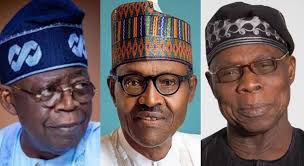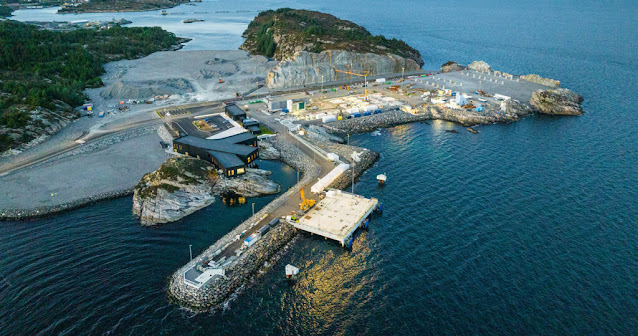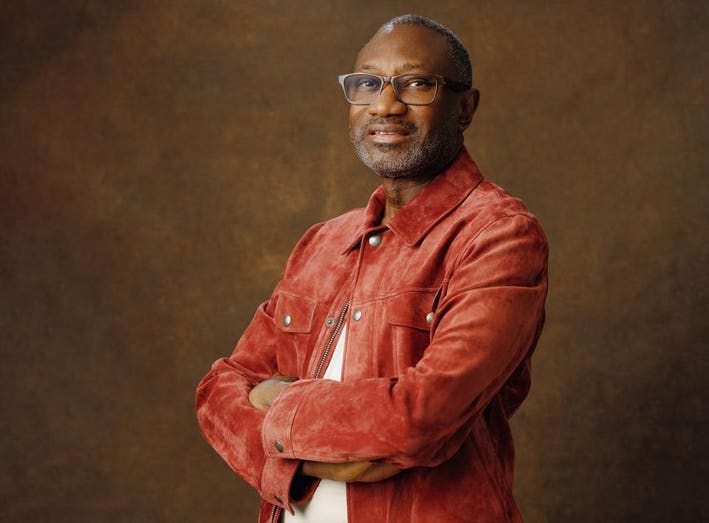In a bold and provocative critique, former Nigerian President Olusegun Obasanjo has taken aim at the administration of President Bola Ahmed Tinubu, asserting that it is currently the only one rivaling the tenure of the late President Muhammadu Buhari in terms of inefficiency. This scathing assessment was made in Obasanjo’s latest book, Nigeria: Past and Future, one of two publications launched in March to commemorate his 88th birthday. The second book, Lest We Forget: Slavery, Slave Trade, Emancipation and Reparation, complements his reflections on Nigeria’s historical and contemporary challenges. In Nigeria: Past and Future, Obasanjo delivers a sweeping review of Nigeria’s leadership since independence, singling out Buhari’s administration (2015–2023) as the “worst civil administration regime” in the nation’s history, with Tinubu’s administration appearing to follow closely in its footsteps.
Obasanjo’s remarks have reignited debates about Nigeria’s governance, leadership accountability, and the persistent challenges facing the nation. As a former military Head of State (1976–1979) and democratically elected president (1999–2007), Obasanjo brings a unique perspective to his critique, drawing on decades of experience in Nigeria’s political landscape. His latest book serves as both a historical reflection and a call to action, urging Nigerians to address the systemic issues that have hindered the country’s progress. This article delves into the details of Obasanjo’s critique, the context of his remarks, and the broader implications for Nigeria’s political and socio-economic future.
The Context: Obasanjo’s Legacy and Literary Contributions
Olusegun Obasanjo is no stranger to controversy or candid commentary. As one of Nigeria’s most prominent statesmen, he has played a pivotal role in shaping the nation’s history, both as a military leader and as a civilian president. His tenure as military Head of State saw the transition to civilian rule in 1979, while his presidency from 1999 to 2007 marked Nigeria’s return to democracy after years of military rule. Known for his outspokenness, Obasanjo has consistently used his platform to critique successive administrations, offering insights drawn from his extensive experience in governance.
The launch of Nigeria: Past and Future and Lest We Forget: Slavery, Slave Trade, Emancipation and Reparation on the occasion of his 88th birthday underscores Obasanjo’s commitment to documenting Nigeria’s history and shaping its future. The former president has authored several books over the years, including My Command, Not My Will, and The Thabo Mbeki I Know, each offering a blend of personal reflections, historical analysis, and policy recommendations. In Nigeria: Past and Future, Obasanjo takes a critical look at the trajectory of Nigeria’s leadership, assessing the performance of its leaders since independence in 1960. His second book, Lest We Forget, explores the historical injustices of slavery and the ongoing quest for reparations, situating Nigeria’s challenges within a global context.
Obasanjo’s latest writings are framed as a contribution to national development, reflecting his lifelong dedication to Nigeria’s progress. “I have had the honour of serving this country as a military Head of State and later as President. So, it might be said that I have sat on both sides of the fence,” he writes in Nigeria: Past and Future. “Now, I am getting close to my departure lounge, maybe without picking my boarding pass yet.” This poignant reflection acknowledges his advancing age while underscoring his urgency to address Nigeria’s challenges before his time runs out. By critiquing the current administration and its predecessor, Obasanjo seeks to inspire a national conversation about leadership, accountability, and the path to a better future.
Obasanjo’s Critique of Buhari’s Administration
The centerpiece of Obasanjo’s critique in Nigeria: Past and Future is his assessment of Muhammadu Buhari’s administration, which he labels as the “worst civil administration regime” in Nigeria’s history. Buhari, who served as president from 2015 to 2023, is a figure with whom Obasanjo has a complex history. Both men share a military background, with Buhari serving as military Head of State from 1983 to 1985 before returning as a democratically elected president. Obasanjo’s critique focuses on the disconnect between Buhari’s rhetoric and his governance, particularly in light of the former president’s earlier criticisms of other administrations.
In the book’s first chapter, titled From the Beginning Till Now: The Missing Key, Obasanjo recalls how Buhari, during his time as a military leader, described the civilian government of President Shehu Shagari (1979–1983) as corrupt, rudderless, and self-serving. These criticisms were used to justify the military coup that brought Buhari to power in 1983. However, Obasanjo argues that Buhari failed to address these same issues during his own civilian administration decades later. “Words are cheap, and what needed to be done was left undone during Buhari’s civil administration from 2015 to 2023 – the worst civil administration so far in Nigeria’s history,” Obasanjo writes. “Maybe those ideas and thoughts were not his; he just read them as written for him. Otherwise, how do you explain the gulf between what he said then and how he governed later?”
Obasanjo’s critique of Buhari’s tenure is multifaceted, touching on issues such as economic mismanagement, insecurity, corruption, and a lack of cohesive leadership. During Buhari’s eight years in office, Nigeria faced significant challenges, including a prolonged economic recession, rising unemployment, and escalating insecurity due to Boko Haram insurgency, banditry, and separatist agitations. The naira’s value plummeted, inflation soared, and public infrastructure continued to deteriorate, leading to widespread disillusionment among Nigerians. Obasanjo argues that Buhari’s administration failed to deliver on its promises of change, leaving the country in a worse state than when he took office.
The former president’s assertion that Buhari’s ideas may not have been his own suggests a deeper critique of the former leader’s decision-making process. Obasanjo implies that Buhari may have relied heavily on advisors or scripts, leading to a disconnect between his public pronouncements and the policies implemented during his tenure. This critique resonates with widespread perceptions of Buhari’s administration as being slow to respond to crises and lacking in strategic vision. For many Nigerians, the failure to address systemic issues such as corruption and insecurity underscored the shortcomings of Buhari’s leadership.
Tinubu’s Administration: A Contender for Inefficiency
While Obasanjo’s critique of Buhari is scathing, his assessment of President Bola Ahmed Tinubu’s administration is equally pointed. Tinubu, who succeeded Buhari in 2023, has been in office for just over two years at the time of Obasanjo’s writing. In Nigeria: Past and Future, Obasanjo asserts that “only Bola Tinubu’s administration seems to be competing with Buhari’s for now” in terms of inefficiency. This statement has sparked significant controversy, given Tinubu’s relatively short time in office and his administration’s ongoing efforts to address Nigeria’s challenges.
Obasanjo’s critique of Tinubu must be understood in the context of the high expectations that accompanied his presidency. As a former governor of Lagos State (1999–2007) and a key figure in the All Progressives Congress (APC), Tinubu campaigned on a platform of “Renewed Hope,” promising to tackle Nigeria’s economic woes, improve security, and strengthen governance. However, his tenure has been marked by significant challenges, including the removal of fuel subsidies, which led to a sharp increase in fuel prices and inflation, and the floating of the naira, which has further weakened the currency. These policies, while aimed at long-term economic stabilization, have caused immediate hardship for many Nigerians, fueling public discontent.
Obasanjo’s comparison of Tinubu’s administration to Buhari’s suggests that the current government has yet to deliver tangible results in addressing Nigeria’s systemic issues. While the former president does not provide specific examples in the quoted excerpt, his broader critique of Nigeria’s leadership implies that Tinubu’s administration has struggled to implement effective policies and inspire confidence among Nigerians. The reference to “competing” with Buhari’s inefficiency is a damning assessment, given Obasanjo’s characterization of Buhari’s tenure as the worst in Nigeria’s history.
The Broader Context: Nigeria’s Leadership Challenges
Obasanjo’s critique of Buhari and Tinubu is part of a larger reflection on Nigeria’s leadership since independence. In Nigeria: Past and Future, he reviews the performance of the country’s leaders, from the First Republic under Sir Abubakar Tafawa Balewa to the present day. This historical perspective provides context for his assessment of Buhari and Tinubu, highlighting the recurring challenges that have plagued Nigeria’s governance, including corruption, ethnic divisions, economic mismanagement, and weak institutions.
Since gaining independence in 1960, Nigeria has faced a complex interplay of political, economic, and social challenges. The country’s vast ethnic diversity, with over 250 ethnic groups, has often been a source of tension, as political power has frequently been concentrated in the hands of a few regions. Corruption has been a persistent issue, undermining public trust and diverting resources from critical sectors such as education, healthcare, and infrastructure. Economic mismanagement, including over-reliance on oil revenue, has left Nigeria vulnerable to global market fluctuations, while insecurity has escalated in recent decades due to insurgencies, banditry, and separatist movements.
Obasanjo’s critique of Buhari and Tinubu reflects his frustration with the failure of successive leaders to address these systemic issues. As a former president who navigated Nigeria through its transition to democracy in 1999, Obasanjo is acutely aware of the challenges of governance in a complex and diverse nation. His tenure was not without criticism, with detractors pointing to issues such as electoral irregularities and attempts to extend his presidency beyond constitutional limits. However, Obasanjo’s supporters argue that his administration laid the foundation for economic reforms, debt relief, and infrastructural development, achievements that stand in contrast to the perceived failures of Buhari and Tinubu.
Implications for Nigeria’s Political Discourse
Obasanjo’s remarks have significant implications for Nigeria’s political discourse, particularly as the country approaches the 2027 general elections. By labeling Buhari’s administration as the worst in Nigeria’s history and suggesting that Tinubu’s tenure is following a similar trajectory, Obasanjo is challenging the APC’s narrative of progress and reform. His critique could galvanize opposition parties and civil society groups, who may use his words to highlight the government’s shortcomings and demand accountability.
However, Obasanjo’s comments also risk deepening divisions within Nigeria’s political landscape. Tinubu’s supporters may view the critique as unfair, given the short duration of his presidency and the complex challenges he inherited from Buhari’s administration. The comparison to Buhari, whose tenure remains a polarizing subject, could further polarize public opinion, with some defending Tinubu’s policies as necessary reforms and others echoing Obasanjo’s concerns about inefficiency.
The timing of Obasanjo’s remarks, coinciding with his 88th birthday and the launch of his books, adds a layer of significance. As he reflects on his mortality—“I am getting close to my departure lounge, maybe without picking my boarding pass yet”—Obasanjo appears driven by a sense of urgency to speak truth to power and inspire change. His willingness to critique sitting presidents, even at the risk of controversy, underscores his role as a statesman who prioritizes Nigeria’s long-term interests over political expediency.
The Path Forward: Obasanjo’s Call for National Development
At the heart of Obasanjo’s critique is a call for Nigeria to address the “missing key” to its development. While he does not explicitly define this key in the quoted excerpt, his broader writings suggest that it encompasses effective leadership, accountability, and a commitment to inclusive governance. Obasanjo’s lifelong dedication to Nigeria’s progress is evident in his assertion that all his writings are intended to inspire national development. By critiquing past and present leaders, he seeks to hold them accountable while offering a roadmap for future progress.
For Nigeria to overcome its challenges, Obasanjo’s critique implies the need for several key reforms:
Strengthening Institutions: Weak institutions have been a recurring barrier to Nigeria’s development. Strengthening the judiciary, electoral commission, and anti-corruption agencies can enhance accountability and reduce impunity.
Economic Diversification: Nigeria’s over-reliance on oil has left it vulnerable to economic shocks. Diversifying the economy through investments in agriculture, technology, and manufacturing is critical for sustainable growth.
Addressing Insecurity: The escalation of insecurity under Buhari’s administration, including Boko Haram, banditry, and separatist agitations, has continued to challenge Tinubu’s government. A comprehensive security strategy, combining military action with socio-economic interventions, is essential.
Inclusive Governance: Nigeria’s ethnic diversity requires inclusive governance that ensures all regions and groups have a stake in the nation’s future. Addressing the marginalization of regions like the Southeast, as highlighted by groups like Ohanaeze Ndigbo, could foster national unity.
Youth Engagement: With a youthful population, Nigeria must invest in education, skills development, and job creation to harness the potential of its demographic dividend.
Obasanjo’s critique serves as a reminder that leadership is not just about holding office but about delivering tangible results for the people. By comparing Tinubu’s administration to Buhari’s, he is urging the current government to learn from past mistakes and prioritize the needs of Nigerians.
Conclusion: A Statesman’s Legacy and a Nation’s Challenge
Olusegun Obasanjo’s latest critique of Nigeria’s leadership, as articulated in Nigeria: Past and Future, is a powerful intervention in the country’s political discourse. By labeling Buhari’s administration as the worst in Nigeria’s history and suggesting that Tinubu’s tenure is competing for that dubious distinction, Obasanjo is shining a spotlight on the systemic failures that continue to hinder Nigeria’s progress. His remarks, rooted in a lifetime of service and reflection, are a call to action for leaders and citizens alike to address the challenges of governance, accountability, and development.
As Nigeria navigates its complex political and socio-economic landscape, Obasanjo’s voice remains a potent force, challenging the status quo and inspiring hope for a better future. While his critique may spark controversy, it also offers an opportunity for introspection and reform. Nigeria’s leaders must heed the lessons of the past and work toward a future where governance is efficient, inclusive, and transformative. As Obasanjo approaches his “departure lounge,” his legacy as a statesman who speaks truth to power continues to shape the nation’s path forward.







